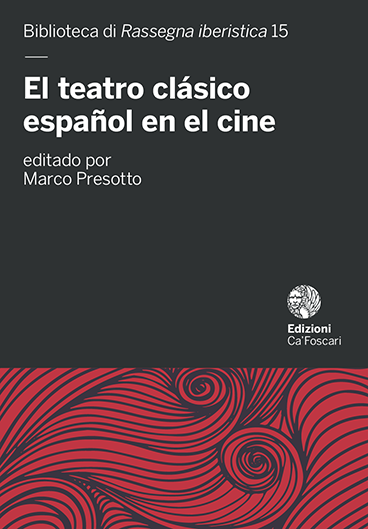Series |
Library of Rassegna iberistica
Volume 15 | Edited book | Classical Spanish Theater in the Cinema
Classical Spanish Theater in the Cinema
open access | peer reviewed-
edited by
- Marco Presotto - Università degli Studi di Trento, Italia - email
Abstract
This book aims to deepen the relationship between classical Spanish theater and cinema through the analysis of a corpus which has been only partially studied and recently rescued by critics. The chapters first deal with theoretical questions about the cinematographic adaptation of a dramatic text, followed by specific studies of significant periods in the political and cultural history of Spain in the 20th century, such as the artistic production of exile and that of the Franco regime, also taking into account the creative contribution of the most recent films based on the theme and their impact on contemporary society.
Keywords Cinematic space • Agustín Moreto • Theater-cinema relations • Reception of the Golden Age theatre heritage • Golden Age Drama • Propaganda • Rafael Alberti • Theatre • María Teresa León • El desdén con el desdén • Filmic rewriting • Film version • Pedro Calderón de la Barca • Theatre in cinema • Monologue • Cinematographic adaption • Francoism • Dialectic high vs low • National identity • Cinema • Spanish Comedia • Spanishness • Siglo de Oro • Lope de Vega • Spanish theater of Golden Century • Theories on adaptation • Film adaptation • Shakespeare • La vida es sueño • Pilar Miró • Reception • Portugal • Spanish cinema • Menos es más • Franco’s regime • Theatrical space • Reception of the Golden Age Theatre Heritage • Argentine cinema • Communism • Hispanism • Naples • Francisco Franco • Spain • Audience • Don Juan • Golden Age Drama Studies • Calderón • Screen adaptation • Spanish Golden Age theater • Nazism • Dictatorship • Censorship • El Alcalde de Zalamea • Adaptation • El perro del hortelano
Permalink http://doi.org/10.30687/978-88-6969-330-4 | e-ISBN 978-88-6969-330-4 | ISBN (PRINT) 978-88-6969-331-1 | Number of pages 200 | Dimensions 16x23cm | Published July 12, 2019 | Language es
Copyright © 2019 Marco Presotto. This is an open-access work distributed under the terms of the Creative Commons Attribution License (CC BY). The use, distribution or reproduction is permitted, provided that the original author(s) and the copyright owner(s) are credited and that the original publication is cited, in accordance with accepted academic practice. The license allows for commercial use. No use, distribution or reproduction is permitted which does not comply with these terms.
-
Las reescrituras fílmicas de la comedia nueva
Un patrimonio desconocido y desatendido (hasta ahora) - July 12, 2019
-
Más allá de la adaptación
El reciclado de materiales temáticos del teatro áureo español en el cine - July 12, 2019
- «Humano, demasiado humano»: reinterpretaciones cinematográficas y televisivas de La vida es sueño en el tardofranquismo
- July 12, 2019
-
La dialéctica alto vs bajo en El perro del hortelano
Del decorado verbal de Lope de Vega a la transposición fílmica de Pilar Miró - July 12, 2019





